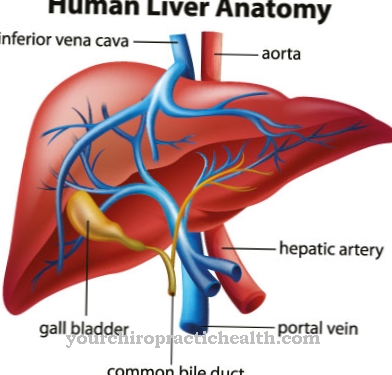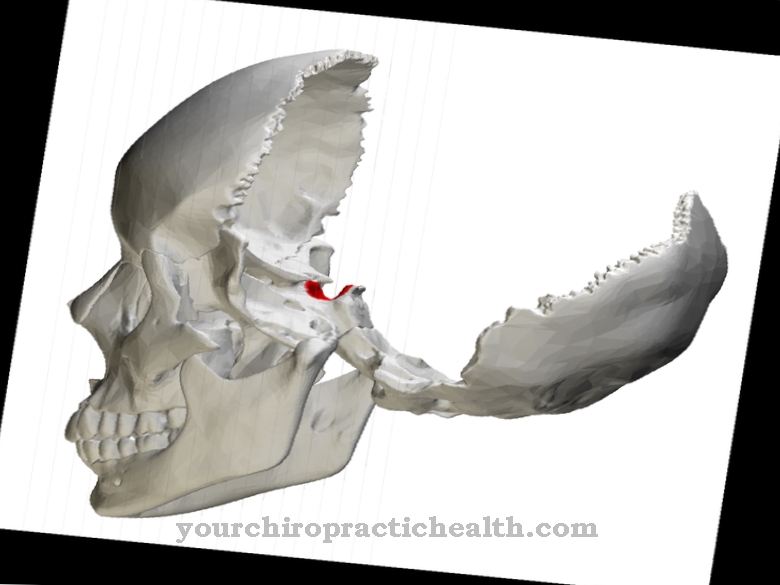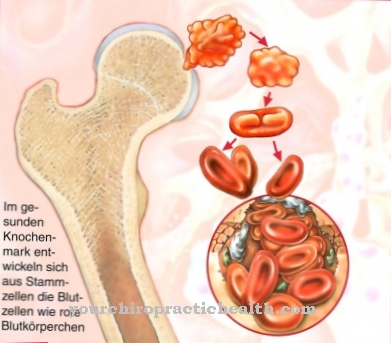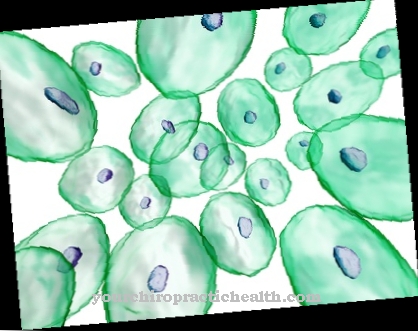Oxidative stress describes a state of metabolism in which free radicals (reactive oxygen compounds) are increasingly present. The body can normally neutralize these with the help of minerals, trace elements, vitamins, phytochemicals, essential fatty acids and amino acids. However, if these substances are missing or insufficiently available, the result is an excess of free radicals, which can lead to irreversible damage in the body's cells.
What is Oxidative Stress?

© designua - stock.adobe.com
Oxidative stress is caused by the formation of too many free radicals. There are not enough antioxidants to break them down. The free radicals are particularly reactive oxygen compounds. These arise to a normal extent in the body's own reactions, for example breathing.
However, there are several factors, such as stress, that can cause extra radicals to be formed. If too many of them are in circulation, they will react randomly with other cells in the body before being destroyed in an oxidative reaction. So that everything in the organism stays in a healthy balance, the body uses so-called antioxidants.
These are radical scavengers. These react with the free radicals in order to protect the other body cells from oxidation. However, if there are not enough antioxidants to bind the free radicals, it is referred to as oxidative stress.
causes
The only question left is: What causes oxidative stress? Various stressors can be used for the increased formation of reactive oxygen compounds. These include, for example, inflammation in the body, improper nutrition, excessive consumption of nicotine and alcohol and emotional stress, for example at work or from problems in the social environment.
However, excessive exposure to UV radiation, the absorption of environmental toxins, for example pollutants from the air, heavy metals and pesticides, or the use of certain medications such as antibiotics and hormone preparations can also promote oxidative stress.
Symptoms, ailments & signs
The consequences that oxidative stress can cause are manifold. Typical warning signs include tiredness, decreased performance and exhaustion. A lack of energy and an increased susceptibility to infections, chronic infections, high blood pressure and impaired wound healing are also noticeable in the case of oxidative stress.
Oxidative stress is also significantly involved in the aging process because it impairs the regeneration and detoxification of body cells. Oxidative stress can therefore, for example, contribute to the premature formation of gray hair and to aging of the skin.
Diagnosis & course of disease
To check whether there is oxidative stress, the antioxidant capacity in the blood can be determined. The test gives a good indication of the relationship between free radicals and antioxidants (radical scavengers). This is the so-called screening test, which records the important antioxidant protective factors.
Furthermore, the test shows how well the body succeeds in rendering the free radicals harmless. This diagnostic method is therefore ideal for detecting an imbalance in the antioxidant balance at an early stage. This parameter also serves to control and optimize treatment with antioxidants, which is based on a change in diet.
The antioxidant test also provides information about the extent and severity of the oxidative stress and thus enables adequate therapy so that oxidative stress can be prevented. This is very important in order to avoid some serious consequences.
Oxidation plays a major role in the aging process and in the development of various diseases, for example cardiovascular diseases, Parkinson's, Alzheimer's, hyperacidity, arteriosclerosis, diabetes and cancer. It is important to note, however, that oxidative stress can be one of several contributing factors.
Complications
Car and industrial emissions, fine dust, UV radiation, cigarette smoke and pesticide residues in our food. Even the oxygen radicals in the air cause oxidative stress. Our organism is constantly exposed to free radicals. This constant oxidative stress can damage our genetic material and promote various diseases.
Oxidative stress has a negative effect on cell renewal in our body because it interferes with cell division. At the end of each chromosome strand there are so-called telomeres. These are very important for cell division. They ensure that the full DNA is decoded and read. With each cell division, they get shorter. The shorter the telomeres, the greater the risk of incomplete reading of the DNA and the associated functional disorders.
In this way, DNA can be damaged. As a result, both genes and cell lipids and proteins can be disturbed in their function. Oxidative stress accelerates the shortening of telomeres. Oxidative stress therefore promotes the development of chronic neurodegenerative diseases and inflammatory diseases of the central nervous system.
For example, Alzheimer's disease, Huntington's disease or Parkinson's disease can be caused in this way. Furthermore, oxidative stress can also trigger hardening of the arteries and coronary heart disease. Tumor formation and the development of cancer can also be promoted due to the DNA damage that is triggered. The mutations in the genes, the disturbed DNA repair mechanism and defective proteins all contribute to this.
When should you go to the doctor?
If signs of a metabolic disorder are noticed, medical advice is sought. Skin changes, deficiency symptoms or cardiovascular problems should be clarified immediately, as they suggest a serious cause. A specialist can answer whether the symptoms are based on oxidative stress. This can also initiate treatment directly and alleviate the causal metabolic disorder by giving suitable medication and other measures. People who have had metabolic problems for a long time or who have another disease that may cause oxidative stress should inform the responsible doctor about the symptoms and complaints.
The pathological metabolic situation can be treated well if it is recognized in good time. If the therapy is too late, it can lead to serious illnesses and diseases. In most cases, taking nutritional supplements is enough to completely eliminate the symptoms. If you have a severe metabolic disorder, further medical measures may be necessary. Since oxidative stress cannot be remedied without medical help, a medical examination is always necessary. In the case of chronic complaints, the cause must be determined and treated as far as possible.You can do this by changing your diet, but also by administering metabolic drugs.
Treatment & Therapy
Ultimately, oxidative stress does not cause disease, but it does encourage it to develop. It is therefore all the more important for health care to reduce it as much as possible. This can be done with various measures, for example by quitting smoking and reducing stress in everyday life.
In addition, a healthy and balanced diet is very important because it ensures that an optimal balance (oxidative homeostasis) is restored. The wrong diet is a serious factor in the development of oxidative stress. For example, you should avoid too much protein, short-chain carbohydrates and industrially manufactured foods.
Many of the foods do not provide enough micronutrients or antioxidants, because these are often lost during the production process and long storage. The body receives important support for reducing oxidative stress from micronutrients, for example vitamin B12, vitamin C, vitamin E, provitamin A and zinc.
The coenzyme Q 10 also appears to be very effective. It should not only reduce free radicals, but also help repair the cells. Fresh fruits and vegetables in particular contain numerous different antioxidants and should therefore be an integral part of the menu.
The same applies to whole grain products, legumes, high-quality vegetable oils and nuts. A change in diet, infusion therapy with antioxidants and / or detoxification are recommended as therapeutic measures.
Infusion therapy is often the only way to intervene effectively and avert oxidative stress in the case of serious illnesses such as neurological diseases or cancer.
Outlook & forecast
Ultimately, oxidative stress does not cause diseases, but it does promote their development. It all comes down to establishing a balance between oxidants and antioxidants. This ensures the detoxification and repair function of the cells. However, the body can only produce the antioxidants itself to a limited extent - they must therefore be taken from food or dietary supplements.
In the case of oxidative stress, it depends on the stress level, which must be checked regularly. If there are no abnormalities here, the treatment can usually be completed. However, it is not uncommon for accompanying diseases to develop as a result of oxidative stress. Typical stress diseases are high blood pressure and circulatory disorders - they must be checked regularly.
With a balanced and healthy diet combined with regular but not excessive exercise, the prospect and prognosis are good that oxidative stress will be effectively prevented or not even occur.
An additional supply of food supplements is usually not necessary. An overdose of antioxidants turns out to be negative for the body - the harm is greater than the benefit. Alcohol consumption and smoking also put a strain on the body.
prevention
Oxidative stress can be prevented if there is a balance between the oxidants and the antioxidants, the body's own radical scavengers. As a result, the detoxification and repair function of a cell is maintained. However, the body can only produce a small amount of the antioxidants itself, so they have to be supplied through food or dietary supplements.
A healthy and balanced diet that contains plenty of fruit and vegetables, regular exercise and a low consumption of nicotine and alcohol are basic requirements. The food you buy should be organic, because natural foods usually contain several antioxidants.
These work synergistically, so that the health value is higher than with vitamin preparations. A balanced diet creates a good basis for an optimal antioxidant balance.
Aftercare
Follow-up care for oxidative stress focuses on regular monitoring of the stress level. At the same time, the therapy must be coordinated and possibly adjusted. A change in diet must be discussed with the doctor. As part of the anamnesis, health problems and the well-being of the patient are discussed.
A comprehensive physical examination is only required in the case of severe symptoms. Usually only the pulse is measured. However, the medical professional can also draw blood or perform imaging tests if necessary. Follow-up care is provided by the doctor who has already made the original diagnosis and taken over the treatment.
If no abnormalities are found, the treatment can be completed. In most cases, however, accompanying diseases have already developed as a result of oxidative stress. Typical stress diseases such as high blood pressure or circulatory disorders must be checked regularly.
Follow-up care then sometimes lasts for years, although the high stress level may have already been cured, but the accompanying illnesses require independent therapy. Chronically ill patients must consult their doctor at least once a week. The family doctor is responsible. The doctor consults the patient's medical record during follow-up care and initiates further measures depending on the results of the examination.
You can do that yourself
Since oxidative stress itself does not cause illnesses, but promotes them very much, it is advisable to take preventive action against it. This is easy to set up with a healthy lifestyle.
The first rule is to avoid risk factors for free radical formation. This primarily includes smoking, but also high alcohol consumption and a stressful everyday life. The most important thing, however, is a healthy and balanced diet. It should be free of ready-made meals, because the following applies: the further a food is processed, the lower its vitamin content. An excess of free radicals occurs when the body does not receive enough antioxidants. Foods with a high proportion of antioxidants are fruits (especially berries, kiwis, apples and cherries), vegetables (peppers, carrots, potatoes, sweet potatoes, lettuce), fish, game meat, nuts and high-quality oils. These foods combined with whole carbohydrates, paying attention to whole grains, promotes the breakdown of free radicals in the body.
In general, it is important to make your diet as varied as possible. Those who, like many athletes, rely on a diet consisting only of proteins and simple carbohydrates, favors oxidative stress. You should also make sure you get enough exercise in everyday life and generally avoid stress. Active or passive relaxation techniques are suitable for this.






.jpg)


















.jpg)

.jpg)
